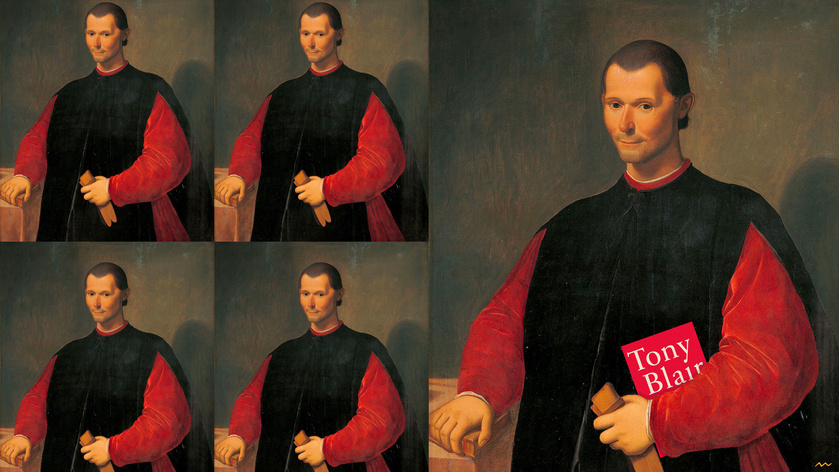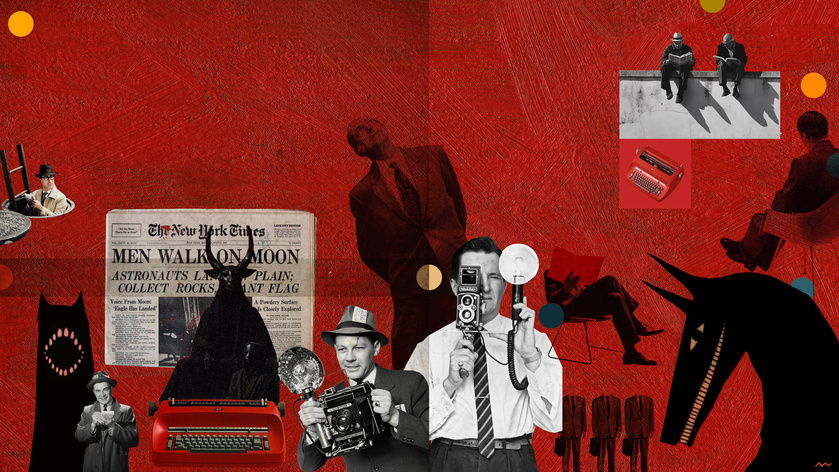None of this stuff is a fair representation of the truth, though, as you can easily find out for yourself if you read his most famous book The Prince. It’s not a long read - only 154 pages in the Penguin Classics edition. But hardly anyone makes the effort, not even supposedly ‘educated’ people like me, because they sorta, kinda think they know what it says already. “End justifies the means,” right?
No. Machiavelli never said that - though I really wanted him to have done when I first skip-read his book while I was at school. We were studying Shakespeare at the time and were learning about a stock character type in Elizabethan drama called the ‘machiavel.’ The machiavel is emblematic of slippery deviousness, cunning and wicked unscrupulousness. Iago, for example, the horrid schemer who persuades poor old Othello that his innocent wife Desdemona is having an affair.
So I got hold of a copy of The Prince - probably even bought a copy and put it on my parents’ bill, as one could do in those days - and spent all of half an hour trying to find examples of Machiavelli saying evil stuff, which I could then quote knowledgeably to impress my teacher and get an A. But I couldn’t because, as I quickly gathered even from this very cursory acquaintance, the book is much more measured, more sympathetic even, than it is in popular repute.
That’s because poor Machiavelli was the victim of a Europe-wide hit job. By the time anyone outside Italy had read The Prince - it wasn’t translated into English til 1640 - Machiavelli’s name had long since become a byword for evil. England’s last Catholic Archbishop of Canterbury Cardinal Pole, who resented his anti-clericism and his rudery towards the Pope, set the ball rolling by declaring him an ‘Enemy of the human race’. Machiavelli’s Christian name - Niccolo - was said to have given the devil his nickname, “Old Nick”. Elizabethan dramatists blamed him as the inspiration for all the scheming and murder that took place in Renaissance Italy. They hated him in France, too, where he was blamed for inspiring the behaviour of Catherine de Medici.
But what had Machiavelli actually done to deserve all this? Not a lot, as it happens. Nicolo Machiavelli was just a jobbing diplomat in Renaissance Florence who had fallen out of favour and so used his spare time to compile a treatise on sound governance that he thought might get him back in with the Medicis. But it wasn’t simply an exercise in sucking up to the elites; it was also an attempt to restore national pride. He had grown up in the golden age of Lorenzo de’ Medici, when Florence had been a first rate city state. Since then, though, it had collapsed into civil war and factionalism, including a disastrous stint under French rule by the invading army of King Charles V. The Prince was, in part, Machiavelli’s vain attempt to help restore the glory days.
He did so not by advising rulers to be more evil, but by taking a pragmatic view of history and trying to work out which methods of governance had proved most conducive to stability and peace. Many of his reference points will be unfamiliar to modern readers. Agathocles the Sicilian, for example.
Agathocles was a potter’s son who, in the 3rd century BC, set his cap on becoming ruler of Sicily. He did so by staging an early version of the Red Wedding scene in Game Of Thrones. Having risen through the ranks of the militia (admittedly through reckless courage), he became praetor of Syracuse, where one morning he assembled the people and Senate, supposedly to discuss important business. Machiavelli tells us: “…at a prearranged signal he had all the senators, along with the richest citizens, killed by his soldiers; and when they were dead he seized and held the government of that city, without encountering any other internal opposition.”
If Machiavelli were the devil incarnate he is reputed to be, this would have been one of his choice examples of how to rule. But it’s not. On the contrary, Machiavelli deplores the episode, explaining: “It cannot be called prowess to kill fellow citizens, to betray friends, to be treacherous, pitiless, irreligious. These ways can win a prince power but not glory.”
Not, let us hasten to add, that Machiavelli is averse to displays of brutality or even cruelty pour encourager les autres. But his occasional justification of what we might consider ‘bad’ behaviour needs to be understood in its proper context. Machiavelli’s starting position - not unreasonable given the chaos, lawlessness and bloodshed of the time - is that men are ‘ungrateful, fickle, liars and deceivers, they shun danger and are greedy for profit.’ Of course, they are capable of virtue too: ‘They would shed their blood for you, risk their property, their lives and their children, so long, as I said above, danger is remote.’ But this virtuous behaviour only tends to last while times are good: ‘When they are danger they turn against you.’
Machiavelli isn’t trying to write a new chapter of the Bible. He is writing an instruction manual for rulers during a particularly violent and unstable period of history. It’s a work of pragmatism, not moral idealism. But still that doesn’t make Machiavelli a bad man, as consider the nuance in his infamous statement that ‘it is better to be feared than loved if you cannot be both’. Note first, Machiavelli’s implicit assumption that it really would be a nice thing, if possible, for a ruler to try to be loved too. And note secondly, the lengthy explanation that follows and which, I think, softens much of the supposed ruthlessness of Machiavelli’s philosophy. ‘Men worry less about doing an injury to one who makes himself loved than to one who makes himself feared,” he says. [True, surely?] ‘The bond of love is one which men, wretched creatures that they are, break when it is their advantage to do so; but fear is strengthened by a dread of punishment which is always effective.’ [True also, surely? And I do like that touch of sad regret in ‘wretched creatures that they are’. It’s hardly Machiavelli’s fault, is it, if we are all fallen?].
But enough Renaissance history and literary criticism. I want to conclude by extrapolating a more general truth about the nature of our understanding of the world. And about how the dark rulers who currently lord it over us - the modern equivalent of the Medicis, the Pope, Charles V and the various Italian city states, I suppose - get away so easily with doing to us what they do.
One of the things we Awake types are often lamenting is the way in which the tiniest, smallest sliver of a fraction of the world’s population - the Cabal; the Predator Class; The Powers That Be; the Satanic Bloodlines; call them what you will - has yet been able to treat us like cattle, or worse than cattle, for generation upon generation. And while obviously, I’m not letting the Cabal off the hook - they really are evil - I do think there’s a degree to which we have invited our own destruction by being so complacent and lazy.
I’m blaming myself as much as anyone. Especially the person I was before I woke up. There I was, blessed with one of the best educations the world supposedly offers, and yet still, mostly, I remained mired in ignorance because I took too easily for granted what I had been told by my imagined superiors - parents, teachers, the government, ‘experts’, whoever.
The Machiavelli thing is just one tiny example of this. Here, briefly, I have with luck demonstrated that everything 99.99 per cent of the people who’ve heard of Machiavelli know about one of the bigger names in history, or political philosophy anyway, is a caricature of a travesty of complete nonsense. It’s at best a crass simplification; at worst - probably for the usual reasons of propaganda and political intrigue - a cynical misrepresentation.
And it happened because, as usual, none of us did our homework. We regurgitated what teacher wanted to hear - Machiavelli bad, m’kay - and the reason teacher wanted to hear it was because he or she hadn’t bothered to do the homework either. Rather than read the actual book, we all went with the received idea of people who hadn’t read the book and took it on trust that the generally accepted narrative was the correct one.
You can apply this rule to: dinosaurs; safe and effective; viruses; the Trump assassination attempt; the Titanic; space; World War II; climate change; 9/11; cholesterol; the shape of the world; pandas; fractional world banking; the sex of presidential wives; Western liberal democracy…
In fact you can probably apply it to just about everything.





















